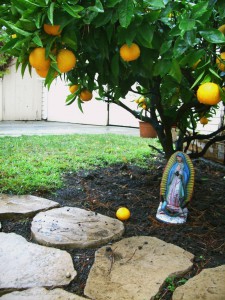I was driving to work this morning, listening to the local liberal talk radio program on KQED. One of the guests this morning was a conservative Christian of some kind, who was involved with some “Christian social group” on the campus of UC Hastings. The host, Michael Krasny, mentioned that this Christian social group did not allow gay and lesbian members.
The Christian fellow, whose name I did not catch, hastened to correct him. He said something like this: We do allow gays and lesbians; this is not about orientation, it is about behaviors. We do not allow our members to have sex outside of marriage, and we do not allow them to have homosexual sex; but if a gay or lesbian was willing to abide by our traditional Christian views of sex and marriage, then they are welcome to join our group. We want everyone to experience what it is to live in Christ, etc. etc.
I listened to this fellow’s tone of voice as he was talking, rather than the standard conservative-Christian content of what he was saying. His tone of voice was defensive, as was only natural, given that he was on a liberal talk radio program. But I also heard smugness, and complacency, and sanctimoniousness, and rigidity. I realized I have heard that exact same tone of voice hundreds of times, and when I hear that tone of voice it always makes me want to insist that I am not a Christian, that I do not believe in that God, and that while I am a follower of Jesus of Nazareth, my Jesus has nothing whatever to do with their Christ.
And then I remembered something written by Hosea Ballou in 1805 that applies to people like this Christian fellow on the radio. Ballou writes:
“Idolatry is the sin of worshipping that which is not, in reality, the true God…. An Almighty [God], omnipresent, infinitely wise and good, may be talked of; but his wisdom, power and goodness must be denied; and he must be a great many millions of miles off, fixed to a certain place, yet everywhere present; infinitely wise, and powerful, yet suffers an everlasting violation of his will;… loves some of his creatures, and hates others; is pleased and displeased with the conduct of his creatures; is perfectly unchangeable, yet loves at one time, and, at another, hates the same object. Such an idol will answer for thousands. Now what are the consequences? Answer, one nation supposes itself the only favorite of God; other people are haters of him, and hated by him. If my God hates those who hate him, I ought to do as my God does, and I will hate them too…. Reader, turn over the pages of history, calculate the rivers of blood which have been shed on account of religious disputes, and ask yourself the question, Is this religion worthy of a Supreme Being?”
[excerpted from A Treatise on Atonement, chapter 3.]
And, dear religious liberals, before you get too smug….
So we religious liberals have let the conservative Christians set up their idol here in America, their false God, a God who hates the majority of humanity, teaches his followers to hate, teaches his followers to start wars in Iraq and Afghanistan, and who condemns billions of people to eternal torture. And in response to this false idol, this false God, what do we religious liberals do? In our turn, too often we hate all gods, refuse to let anyone mention the word “God,” hate the conservative Christians, and when we talk about religion we use a tone of voice that is defensive, smug, complacent, sanctimonious, and rigid, all at the same time.
Hosea Ballou offers us another path: We can engage critically with the Bible and the Christian tradition that is so much a part of Western culture. We can use reason, humor, and good common sense to come to our own understanding of the Bible, one of the central books of our Western tradition. We can follow truth, instead of letting others impose their false idols on us.


